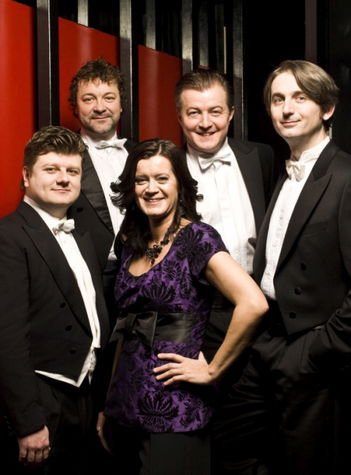1 / 6
Advent Concert I • Afflatus Quintet
Programme
Wolfgang Amadeus Mozart (arr. Bill Holcombe)
The Magic Flute, overture, K 620
Joseph Haydn (arr. Harold Perry)
Divertimento in B flat major Hob II:26
Johann Sebastian Bach (arr. Thomas Schneider)
Bist du bei mir, geh' ich mit Freuden zum Sterben, BWV 508
Ludwig van Beethoven (arr. Franz Vester)
Adagio and Allegro for musical clock, WoO. 33
Jean-Philippe Rameau (arr. Fernand Oubradous)
Sinfonia and Dances
Johann Sebastian Bach (arr. Dan Braden)
“Schafe können sicher weiden”, aria from the cantata Was mir behagt, ist nur die muntre Jagd, BWV 208
Johann Sebastian Bach
Menuet and Badinerie from the Suite in B minor, BWV 1067
Ferenc Farkas
Early Hungarian Dances from the 17th Century
Performers
Afflatus Quintet
Roman Novotný flute
Jana Brožková oboe
Vojtěch Nýdl clarinet
Ondřej Roskovec bassoon
Radek Baborák French horn

Customer Service of Czech Philharmonic
Tel.: +420 227 059 227
E-mail: info@czechphilharmonic.cz
Customer service is available on weekdays from 9 a.m. to 6 p.m.
Performers
Afflatus Quintet

In 1995, a group of five remarkable Czech musicians got together to form the Afflatus Quintet. Just one year later in October 1996, the quintet established itself internationally on the chamber music series of the Leipzig Gewandhaus (other guests of this exclusive series have been the quintets of players from the Berlin Philharmonic and the Vienna Philharmonic). The quintet soon attained the pinnacle of artistic success with victory at the prestigious ARD International Music Competition in Munich (1997).
Next came a series of successful concerts in this country and abroad (Berlin, Stuttgart, Munich, Hamburg, Brussels, Paris, international festivals in Finland, Switzerland, and the German regions Schleswig-Holstein and Rheingau and cities Bad Hersfeld and Augsburg). They have made especially noteworthy festival appearances at Prague Spring (Czech Television recorded their 2015 concert live), Smetana’s Litomyšl, Strings of Autumn, Janáček May in Ostrava, Concentus Moravia, Janáček’s Hukvaldy, and Moravian Autumn in Brno.
There have been memorable concerts in the Rudolfinum’s Dvořák Hall with the Prague Radio Symphony Orchestra and the pianist Gerhard Opitz along with concerts organised by the Czech Chamber Music Society, which honoured Afflatus Quintet in 1998 with an award for exceptional interpretations mostly of music of the 20th century. The quintet won the award again five years later (for Dvořák’s “American Quartet”, Op. 96, arranged for wind quintet), making it the first ensemble in history to receive the prize twice. For the 2011/2012 season, the Afflatus Quintet was the ensemble-in-residence of the Czech Chamber Music Society.
The year 2000 saw their Japanese debut followed by intensive collaboration with the Japanese recording label Octavia Records. At some of the concerts, the quintet’s players also appeared as soloists (Mozart concertos accompanied by the Prague Chamber Orchestra and the Yomiuri Symphony Orchestra). During tours of Japan, the Afflatus Quintet appeared at venues including Tokyo’s prestigious Suntory Hall, giving performances of such works as Mozart’s Sinfonia concertante as part of Mozart celebrations. The tour also included masterclasses at Tokyo’s prestigious Toho Gakuen School of Music. In September 2012, the quintet introduced itself to Australia at the famed Sydney Opera House.
So far, the Afflatus Quintet’s discography consists of eight albums with music by Czech, French, and German composers. Their Mozart CD on the Supraphon label was among the finalists nominated for the 2003 Golden Harmony Prize.
The quintet members are flautist Roman Novotný (Czech Philharmonic, Prague Conservatoire), oboist Jana Brožková (Czech Philharmonic and the Academy of Performing Arts in Prague), clarinettist Vojtěch Nýdl (Prague Radio Symphony Orchestra, Prague Philharmonia, Pilsen Conservatoire), bassoonist Ondřej Roskovec (Czech Philharmonic, Prague Conservatoire), and former principal horn of the Berlin Philharmonic and conductor Radek Baborák. All of them also have busy teaching schedules, and they share the opinion that quintet playing is one of the most difficult kinds of performing: “Our sound is the point of intersection of five different instruments and colours, five different ways of playing attacks, and five individual performing personalities.”